Transforming Smiles, Transforming Lives
Cosmetic dental procedures have soared in popularity, not only for their aesthetic benefits but also for their profound psychological impact. This article explores how these procedures influence self-esteem and confidence, supported by scientific research and patient experiences. We delve into the prevalence of self-esteem improvements, the emotional benefits of smile makeovers, factors influencing patient satisfaction, and the broader societal implications connected to cosmetic dentistry.
Psychological Benefits of Cosmetic Dental Procedures
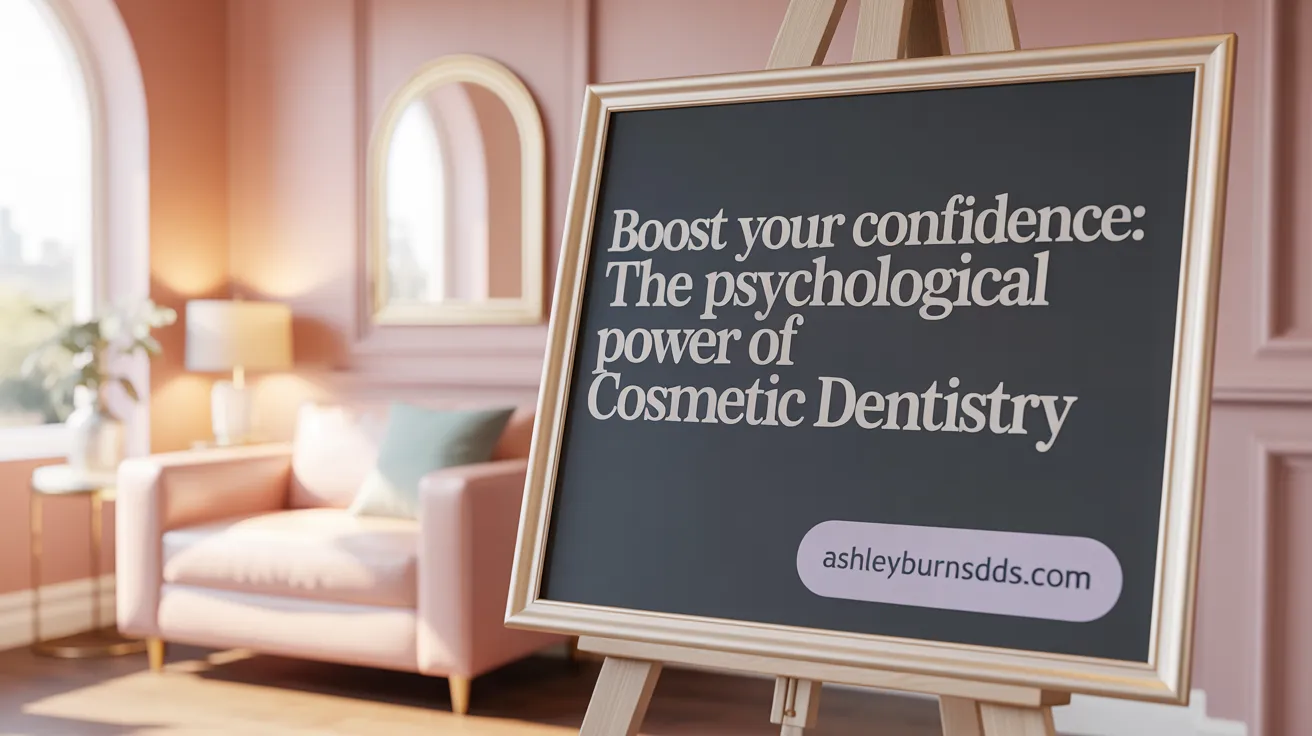 Cosmetic dental procedures offer notable psychological advantages, particularly in boosting self-esteem and confidence. By addressing dental imperfections such as discoloration, misalignment, or missing teeth, these treatments help individuals achieve a more attractive smile. A pleasing smile is closely linked to positive self-perception and can significantly enhance one's self-image (Impact of Cosmetic Dentistry on Confidence).
Cosmetic dental procedures offer notable psychological advantages, particularly in boosting self-esteem and confidence. By addressing dental imperfections such as discoloration, misalignment, or missing teeth, these treatments help individuals achieve a more attractive smile. A pleasing smile is closely linked to positive self-perception and can significantly enhance one's self-image (Impact of Cosmetic Dentistry on Confidence).
When individuals see improvements in their teeth and smile, they often feel more attractive and socially confident. This increased confidence can reduce feelings of self-consciousness and social anxiety, encouraging more active participation in social and professional interactions (Psychological Effects of Cosmetic Dentistry). Scientific studies have shown that procedures like teeth whitening and veneers can lead to immediate boosts in self-esteem, contributing to an improved overall mental state (Psychological Impact of Teeth Whitening).
Beyond mere aesthetics, the psychological impact of cosmetic dentistry fosters emotional well-being. Improved self-confidence influences decision-making, personal relationships, and career opportunities. Many patients feel more approachable and trustworthy after treatment, which enhances their social lives and professional endeavors (Cosmetic Dentistry and Mental Health).
Furthermore, experiencing positive results from cosmetic procedures can motivate individuals to maintain healthier oral habits, further supporting their self-esteem. The sense of achievement and self-care associated with these treatments supports mental resilience and overall happiness (Boosting Your Confidence with Cosmetic Dentistry).
In summary, cosmetic dental procedures do more than transform smiles—they actively contribute to psychological health by elevating self-esteem, fostering confidence, and promoting emotional well-being. These benefits collectively improve quality of life, helping individuals face daily challenges with a more positive outlook (The Psychological Impact of Cosmetic Dentistry.
Enhancing Self-Image and Personal Confidence Through Cosmetic Dentistry
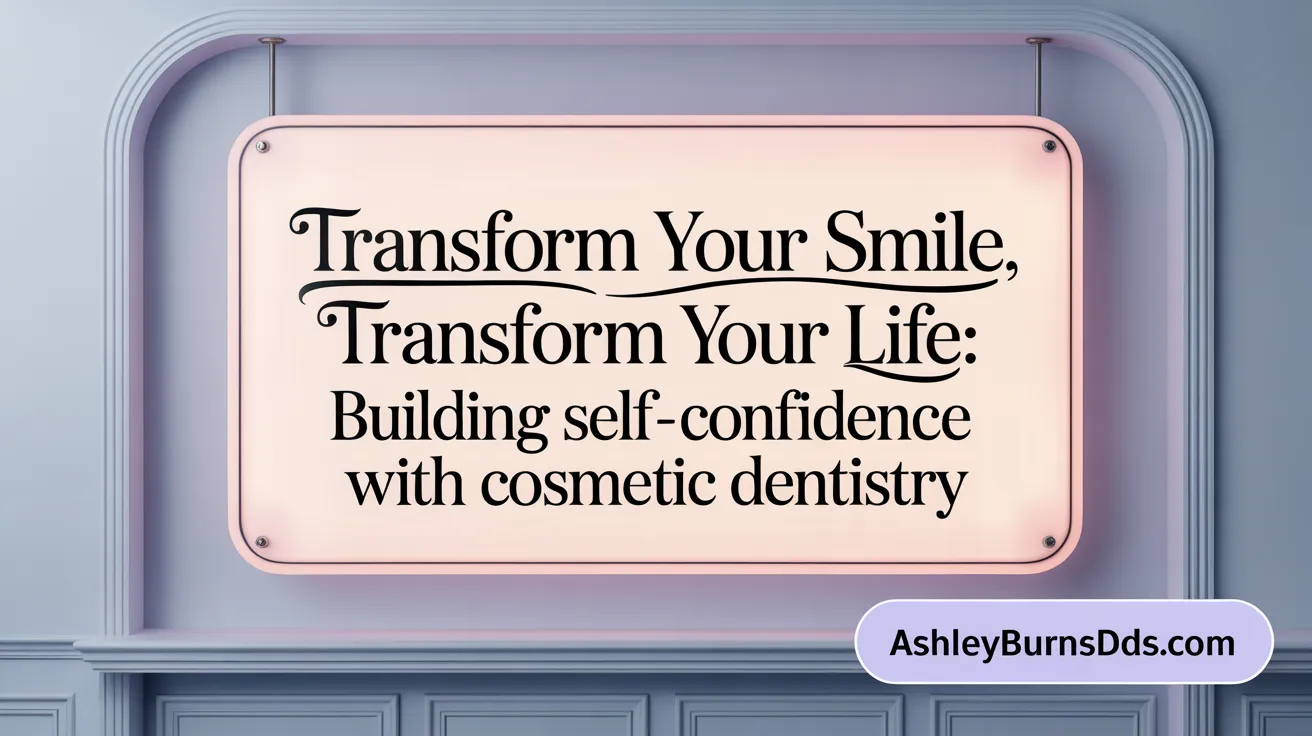 Cosmetic dentistry plays a vital role in improving how individuals view themselves and their confidence levels. By addressing dental imperfections such as discoloration, misalignment, chips, or gaps, procedures like teeth whitening, veneers, and orthodontic treatments can create a more harmonious, attractive smile. When people are satisfied with the appearance of their teeth, they often experience a boost in self-esteem and a more positive self-image.
Cosmetic dentistry plays a vital role in improving how individuals view themselves and their confidence levels. By addressing dental imperfections such as discoloration, misalignment, chips, or gaps, procedures like teeth whitening, veneers, and orthodontic treatments can create a more harmonious, attractive smile. When people are satisfied with the appearance of their teeth, they often experience a boost in self-esteem and a more positive self-image.
The psychological benefits of a beautiful smile extend beyond aesthetics. Many patients report feeling more approachable, trustworthy, and confident in social and professional situations. This enhanced self-image can reduce feelings of social anxiety and empower individuals to engage more comfortably in conversations and public interactions (Psychological Impact of Cosmetic Dentistry.
Specific cosmetic treatments significantly influence self-esteem. For instance, teeth whitening can brighten the smile, making individuals feel fresher and more attractive instantly. Smile rehabilitation, which combines multiple procedures like veneers, crowns, or orthodontics, can dramatically transform appearance, leading to long-lasting confidence improvements (Boosting Self-Esteem with Cosmetic Dentistry).
Overall, cosmetic dentistry not only improves the physical appearance but also fosters emotional well-being. It helps individuals overcome self-consciousness related to dental issues, encourages better oral health habits, and promotes a more confident, positive outlook on life (Impact of Cosmetic Dentistry on Confidence.
Scientific Evidence on Cosmetic Dentistry and Self-Esteem Enhancement
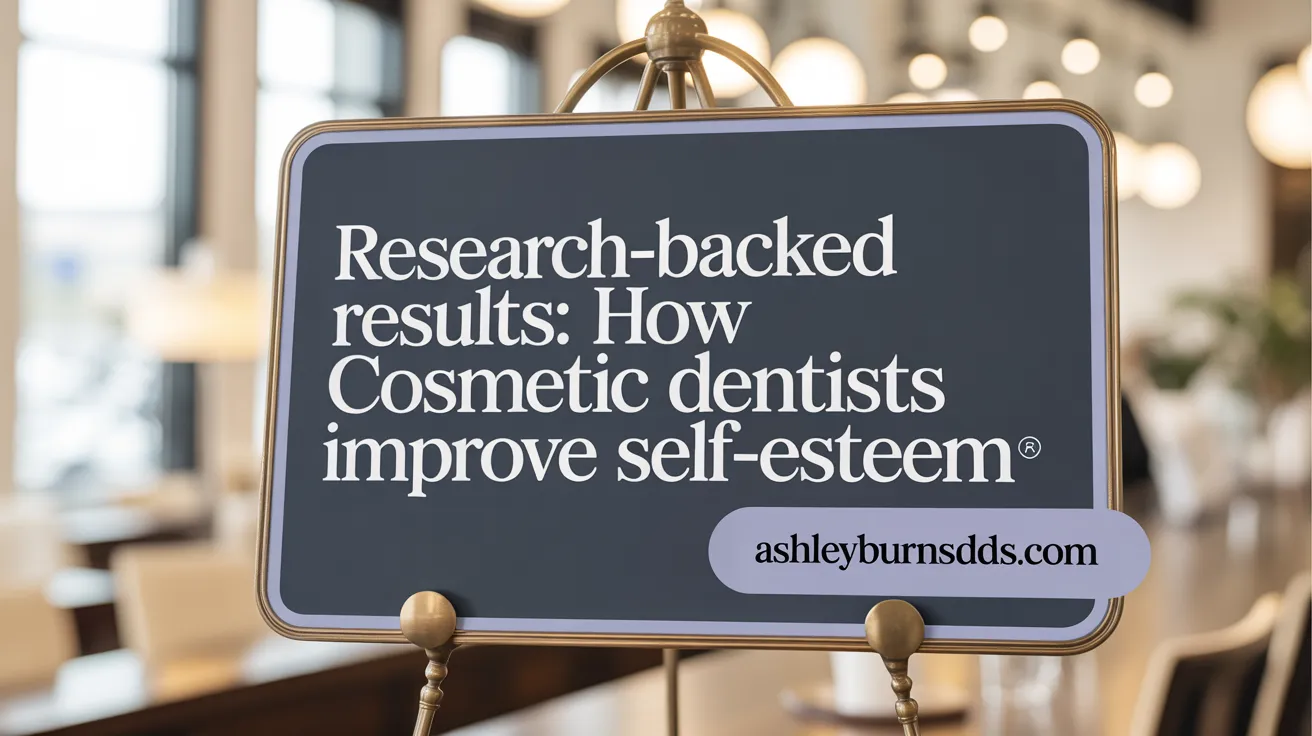 Research has consistently demonstrated that cosmetic dental treatments significantly improve self-esteem and psychological well-being. Several studies employ validated psychological assessments, such as the Rosenberg Self-Esteem Scale (RSES), Body-Esteem Index, and other inventories, to measure changes before and after cosmetic procedures. For instance, findings published in reputable journals like the Journal of Orthodontics and the European Journal of Orthodontics highlight that patients undergoing treatments such as teeth whitening, porcelain veneers, orthodontics (including Invisalign), and dental implants report meaningful increases in self-perception and confidence.
Research has consistently demonstrated that cosmetic dental treatments significantly improve self-esteem and psychological well-being. Several studies employ validated psychological assessments, such as the Rosenberg Self-Esteem Scale (RSES), Body-Esteem Index, and other inventories, to measure changes before and after cosmetic procedures. For instance, findings published in reputable journals like the Journal of Orthodontics and the European Journal of Orthodontics highlight that patients undergoing treatments such as teeth whitening, porcelain veneers, orthodontics (including Invisalign), and dental implants report meaningful increases in self-perception and confidence.
Empirical evidence suggests that these interventions can lead to positive shifts in body-esteem and social confidence, which are critical for overall mental health. A notable study involving 17 patients utilizing porcelain laminate veneers observed significant positive changes in body-esteem scores, with psychological assessments confirming these improvements (source). Furthermore, surveys indicate that a large proportion of patients—often above 70%—experience enhanced self-esteem and satisfaction following cosmetic dental procedures (source).
Studies also reveal that individuals with initially low self-esteem and poor dental aesthetics are more motivated to seek cosmetic treatments, leading to substantial psychosocial benefits post-treatment (source). Overall, scientific research underscores a strong correlation between aesthetic dental interventions and improved mental health, validating cosmetic dentistry as a meaningful approach to enhancing self-esteem and quality of life (source.
Factors Influencing Patient Satisfaction and Perception of Outcomes
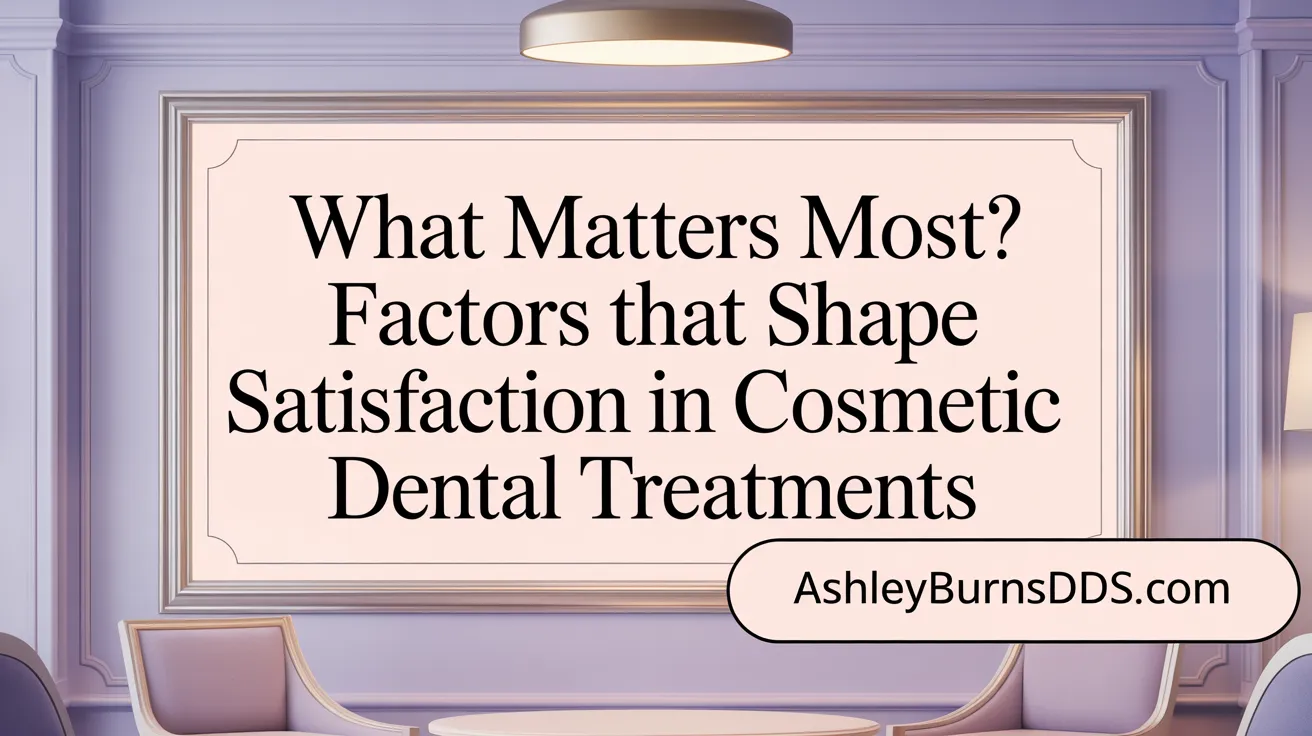
What factors influence patient satisfaction and perception of aesthetic outcomes in cosmetic dentistry?
Patient satisfaction in cosmetic dentistry depends on multiple interrelated factors. One of the most important is the quality of the clinical results and the longevity of the treatment effects, which heavily influence how patients perceive the success of their procedures. Achieving consistent, durable, and natural-looking outcomes enhances overall satisfaction (Patient satisfaction with dental esthetic treatments).
Clear and effective communication between the dentist and patient is vital. Managing expectations by discussing what can realistically be achieved helps prevent dissatisfaction. When patients understand the goals and limitations of their treatment, they are more likely to perceive the results positively (Expert tips for dental patient satisfaction).
Several patient-specific factors also play a role. Gender, personality traits, previous dental experiences, and particular aesthetic concerns like tooth color or protrusion can impact satisfaction levels. For example, patients particularly concerned about tooth discoloration or misalignment may have different satisfaction thresholds (patient satisfaction with dental appearance).
The choice of treatment modality influences perceptions as well. Modern technologies such as digital smile design and CAD/CAM systems can improve precision and patient confidence (cosmetic dentistry). Additionally, the treatment duration, costs, and the environment of the dental practice—such as comfort and professionalism—contribute to overall perceptions (Patient satisfaction in cosmetic dentistry factors.
Addressing dental anxiety and ensuring a smooth, painless treatment process can boost patient confidence and satisfaction. Realistic expectations, comprehensive consultation, and individualized treatment plans are essential to align the outcome with patient desires (Expert tips to assure dental patient satisfaction.
In summary, successful cosmetic dentistry relies on technical excellence, effective communication, managing expectations, and considering individual patient factors. These elements collectively shape patient satisfaction and how they perceive the aesthetic success of their treatments, ultimately enhancing their self-esteem and social confidence (The Impact of Cosmetic Dentistry on Confidence, Impact of Cosmetic Dentistry on Self-Esteem.
Societal and Psychological Influences on the Demand for Cosmetic Dentistry
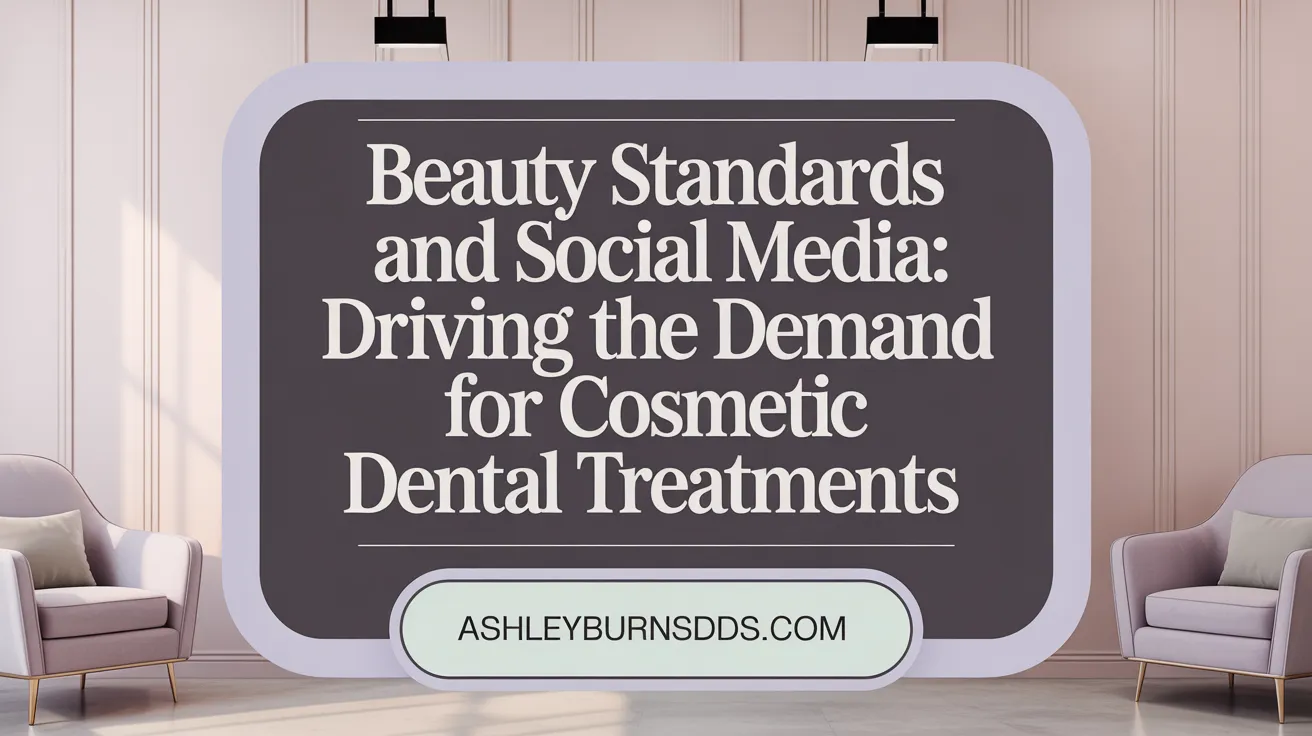 The popularity of cosmetic dentistry is deeply intertwined with societal norms and psychological factors that influence individual perceptions and motivations. Societal standards of beauty, which are often propagated through media and popular culture, shape our ideas about what constitutes an attractive smile and facial appearance. These norms can create pressure to conform, prompting many to pursue aesthetic dental procedures to achieve the 'ideal' look. For more on these societal and psychological factors, see Self-esteem and esthetic dental treatments and Popularity of cosmetic dentistry and social media influence.
The popularity of cosmetic dentistry is deeply intertwined with societal norms and psychological factors that influence individual perceptions and motivations. Societal standards of beauty, which are often propagated through media and popular culture, shape our ideas about what constitutes an attractive smile and facial appearance. These norms can create pressure to conform, prompting many to pursue aesthetic dental procedures to achieve the 'ideal' look. For more on these societal and psychological factors, see Self-esteem and esthetic dental treatments and Popularity of cosmetic dentistry and social media influence.
Social media platforms amplify these influences by showcasing curated images, often enhanced with filters and editing tools, fostering a culture of perfectionism. This exposure tends to increase dissatisfaction with one's natural appearance, especially among younger populations such as Generation Z, who are more active on digital platforms. The pursuit of a flawless smile is thus driven not only by personal desire but also by social comparison and the need for social validation. See Impact of social media on aesthetic dentistry and Mental health benefits and social influences of cosmetic dentistry.
Psychologically, self-esteem is a significant factor affecting interest in cosmetic procedures. Individuals with lower self-esteem or body image concerns are more likely to seek dental enhancements to improve their confidence. Perfectionism, a trait characterized by setting unrealistically high standards, also correlates with a higher motivation to undergo cosmetic treatments to attain these ideals. For detailed findings on self-esteem’s role, see Self-esteem and cosmetic dental treatment interest and Psychological effects of aesthetic dental treatment.
Demographic disparities play a role as well. For example, gender differences are evident, with women more likely to pursue cosmetic dental procedures than men, possibly due to societal expectations relating to appearance. Ethnic and cultural backgrounds influence perceptions, with some groups placing different levels of importance on dental aesthetics based on cultural norms and values. Relevant insights can be found in Gender differences in dental satisfaction and aesthetics and Impact of dental aesthetics on self-esteem across demographics.
Clinicians should be aware of these societal and psychological drivers when assessing patient motivations. Screening for tendencies such as body dysmorphic disorder is essential to prevent unnecessary procedures motivated by distorted self-image. Promoting media literacy and realistic perception of beauty can help ensure that patients' desires are rooted in healthy self-esteem rather than societal pressures or unrealistic aesthetic standards. Ultimately, understanding these influences allows practitioners to ethically guide patients and support their psychological well-being while achieving satisfactory aesthetic outcomes. For guidance on ethical practice and patient psychological support, refer to Psychological impact of cosmetic dentistry and Expert tips to assure dental patient satisfaction.
Emotional and Social Benefits of Smile Makeovers and Aesthetic Treatments
Smile makeovers and aesthetic dental treatments provide a wide range of emotional and social advantages. By improving the appearance of teeth—such as correcting discoloration, alignment issues, and chips—these procedures can dramatically enhance an individual’s self-esteem and confidence. Patients often report feeling more attractive and self-assured, which encourages them to smile more openly and engage actively in social and professional interactions (Psychological Impact of Teeth Whitening, Boosting Your Confidence with Cosmetic Dentistry.
Beyond boosting confidence, aesthetic dental improvements can help reduce feelings of social anxiety and embarrassment caused by dental imperfections. A confident smile not only improves personal well-being but also influences how others perceive us, often leading to better first impressions, increased trustworthiness, and greater social acceptance. These positive changes can open doors to new opportunities, strengthen relationships, and improve overall mental health (The Impact of Cosmetic Dentistry on Confidence, Cosmetic Dentistry and Mental Health.
Scientific studies confirm that cosmetic dentistry can lead to significant emotional benefits, including reduced social anxiety and improved outlook on life. People experiencing dissatisfaction with their smile often feel less motivated to participate socially; however, successful treatments encourage a more positive self-image and social engagement (Psychological impact of cosmetic dentistry, Impact of Cosmetic Dentistry on Self-Esteem.
In summary, smile makeovers and aesthetic dental treatments do more than just improve appearance—they foster emotional resilience, enhance social confidence, and contribute to a more joyful and fulfilling life. The collective benefits support a healthier mental state, better social interactions, and a higher quality of life overall (Smile Makeovers and Mental Health, Cosmetic Dentistry Benefits).
Effectiveness and Broader Impact of Cosmetic Dentistry on Psychological Health and Social Perceptions
What is the overall effectiveness and success rate of cosmetic dental treatments in improving psychological health?
Cosmetic dental treatments are highly effective in enhancing psychological well-being. Most individuals experience a notable increase in self-esteem and confidence following procedures like teeth whitening, veneers, or orthodontics. Studies consistently show that a majority of patients report satisfaction with their altered smile, which positively influences social interactions and reduces feelings of social anxiety (Psychological impact of cosmetic dentistry. Beyond the immediate aesthetic improvements, these treatments promote healthier oral hygiene habits and foster long-term emotional benefits, such as increased happiness and a more positive self-image (Boost Your Mental Health with Cosmetic Dentistry. When patients have realistic expectations and choose qualified practitioners, cosmetic dentistry proves to be a valuable tool in advancing mental health and social functioning (Expert tips for dental patient satisfaction.
What evidence-based insights exist on how cosmetic dental procedures contribute to social perceptions, professional opportunities, and personal well-being?
Research indicates that cosmetic dental procedures significantly improve facial attractiveness by making individuals appear more approachable, trustworthy, and successful (Facial attractiveness and dental esthetics. Enhanced dental aesthetics lead to increased self-confidence, encouraging more active participation in social and professional settings (Cosmetic Dentistry and Mental Health). A more attractive smile positively influences how others perceive competence and friendliness, which can open doors to better job prospects and professional advancement (Impact of Cosmetic Dentistry on Confidence.
Moreover, the psychological benefits extend to personal well-being by reducing insecurities related to dental appearance. People report feeling more satisfied with their social interactions, experiencing less social withdrawal, and gaining a stronger sense of self-worth. This holistic improvement encompasses not just physical appearance but also emotional resilience, underscoring the importance of cosmetic dentistry in fostering overall social and mental health (Psychological effects of a better smile).
A Smile’s Lasting Impact on Self-Esteem and Life Quality
The substantial body of evidence underscores that cosmetic dental procedures are more than mere aesthetic enhancements—they are powerful tools for boosting self-esteem, personal confidence, and emotional well-being. A significant majority of patients report increased self-esteem and improved social interactions following treatments, supported by rigorous research and patient testimonials. The psychological uplift from these procedures translates into enhanced quality of life, better professional opportunities, and a more positive self-image. While patient satisfaction depends on various factors including communication and expectation management, the overall trend points to cosmetic dentistry’s critical role in improving mental health and social confidence. As societal norms evolve and technology advances, the appeal of cosmetic dental treatments will likely continue to grow, fostering a healthier relationship between appearance and psychological wellness.
